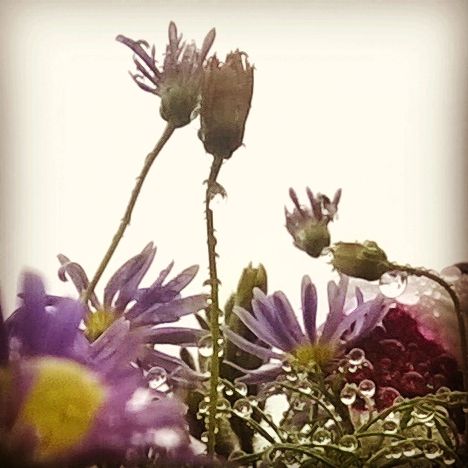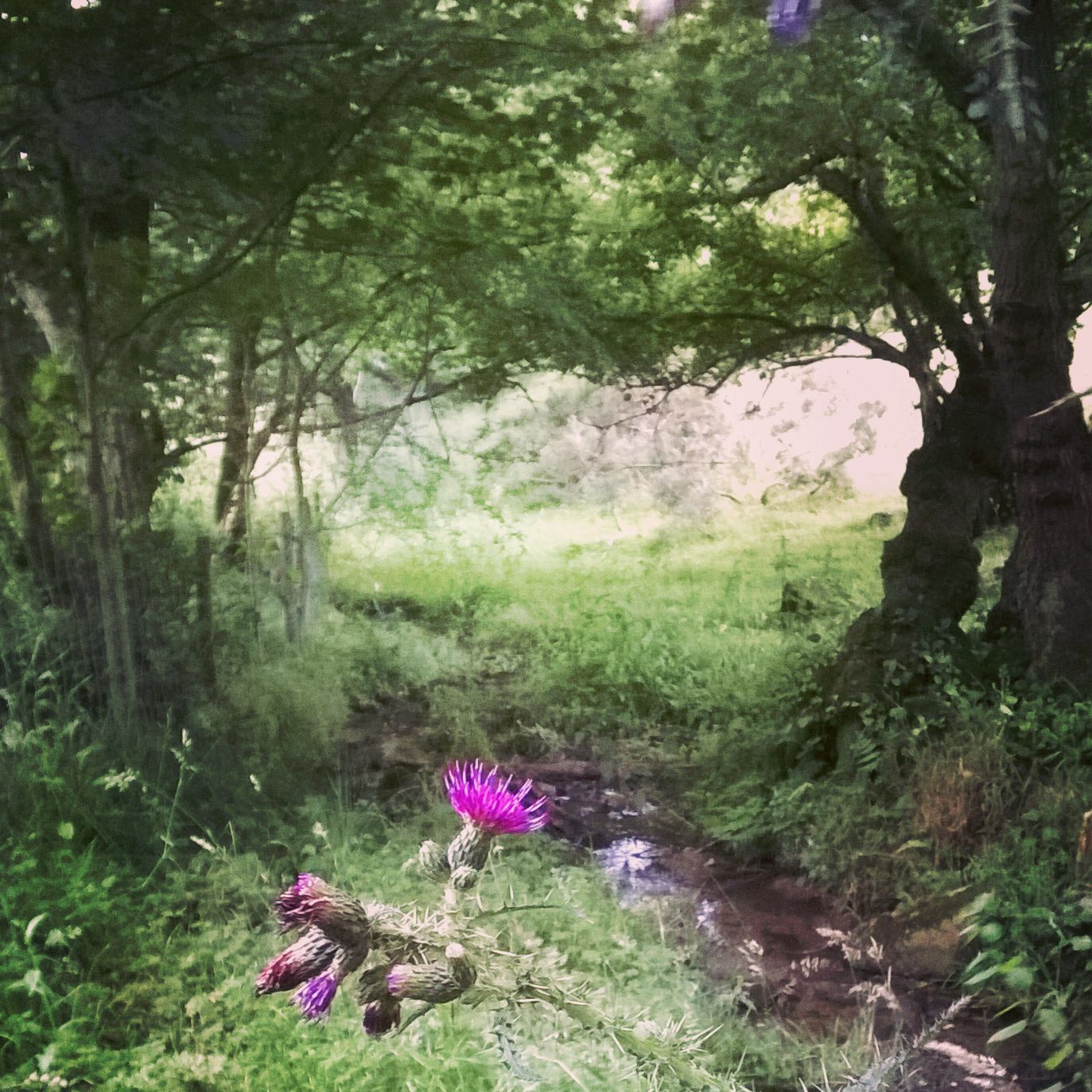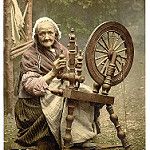No child of mine

At twelve, you should have started down the pit. Coal fuelled the war effort in 1916. There was plenty of work. Instead of marching with the rest in wooden clogs on cobble stones when the knocker-up called before daybreak, you stayed with your mother. Your hair had fallen out, root by root, almost overnight. Your tiny frame got thinner and scrawnier. You couldn't cope with the horror of the accident, the desperation of your mother, the loss of your hero, the lack of food.
Roisin took in laundry, trying to make ends meet, and sent you to the drying field, where sheets were spread on grass and draped over hedges in the salty breeze. All you had to do was watch white patches across the green, and run to catch them when they billowed and flew. So you sat, and watched, too deeply vigilant, listening out for the next siren, running to see who came home on time, counting blackened men in like sheep.
The clock-maker called you from his window, by a quiet raised eye-brow, and set you on for sixpence. A daily task to listen to the ticking, then wind them up, not too tight, just right. You checked dainty wrist watches, silver with dark marquesite; fob watches for gentlemen, on heavy chains of gold; baser metals on worn leather straps carefully oversown. Then you did the clocks, mantelpiece small, larger to stand against the wall, and taller still to grace the grandest houses. You'd set them right, gaining or losing, learning to count with a rhythmic soundtrack that steadied your heartbeat, silent apprentice to the healing of time, in a never-changing framework of twelve repeated figures.
You got skinnier, and your hair did not grow back. People talked of summer, and gypsies began to gather. You climbed through forbidden woods alone, where they said the Ginny lay in wait, searching out their camp. You heard voices, and watched their piebald horses easily graze, you scrawny bald boy, well clear of those terrifying dogs. No-one challenged you. Just glanced at your shoulder, as you would a wild and fearful creature. They recognised your face, the spit of your Dad.
'Fetch us fodder, lad,' someone called. There was money in it. All you had to do was beg peelings from the kitchens where little girls you knew were scullery maids. You put some in the pot at home and then alone you climbed back up the hill, with this horse mash.
There was meat in their pot. You smelled it, ate it, and took pennies home, sometimes a rabbit, not thinking one day soon they would be gone. They started telling stories round the fire, of the fairs they would visit, all summer long. They saw your little eyes open. They saw your mother. Jimmy went to see your Dad, in the asylum. No child of mine, he'd tried to say, voice cracked, mouth parched, tears washing from one blind eye. Don't try to talk, they answered. And soon you helped pack, hitching horses up to horseshoe shaped caravans, bridled and blinkered for the road.
Travellers never picked flowers. They painted them in garlands on the wood, refreshing and renewing, always proud of their expression, not depleting nature's seed stock for a fancy. The men you looked up to now wore neckerchiefs of matching colours, tied to show whose band they were, and who wasn't with them. You noticed, more and more.
At first they let you look after the horses, feed and brush and wash and walk along. The sound of their hooves steady like the ticking of the clocks. The nuzzling of muzzles warming you to whispering. Every night, the pot of filling food. After that a foul-stinking poultice, not an option, goose-greese mix plastered on and roughly massaged in, as you leaned back on her bony old knees. Voices rose and fell around like water falling. She'd seal it with a brown paper cap, and send you to crackly sleep on those twigs of tired legs.
Over the days they noticed you grow stronger, your pale face gradually turning brown. Heavier tasks were given and accomplished, and other lads dared wrestle you to the ground, as they would among themselves. Did it trigger an outlet for your anger? Was it part of the plan? By the time you got to Appleby the first time, they might have seen a flickering of a man.

Someone taught you how to tickle trout, by quiet streams where others would not come, looking for the overhanging banking, lying on stomachs, just downstream. Drape your hand into the water, gliding imperceptibly in weed. To catch a fish, think fish, you curve a current. Mesmerised trout swim into your palm.
To catch a boy, think like a boy. The old one carried on, crooning and cradling your baby bald head surrounded by the sounds of Mourne: the shooing of chickens from a kitchen, the coughs, converse and song. The lilting immersion of consciousness in this generous collective, merged for you now in a child's harsh exile, in a land where they say you belong, of undersea fires raging, of never coming home.
Green, green, she sang, green, green, my lad. Her old arms creaked and rocked. Across the Celtic sea she rowed you home.
You became a real sharpshooter, winning rifle contests at the fairs, so easy after all that work of poaching dusk and dawn, in sun and rain, all the way along. Strong, bronzed and confident when that summer ended, they brought you back here to your Mum.
Still only twelve, with your twinkling eyes of misty blue, and long black curls.
No child of mine is going down those pits, he'd cried.
No indeed.
Nor did you.

* * * * * * * * *
Illustration : an Irish traveller from the 1890's, from the museum collection (Flickr) just a few years before this tale and in the same style, in memory of and with immense gratitude to the lady who saved the boy who was my grandfather.
Information:
Hair loss like this is still seen in children suffering under war conditions, documented lately in Afghanistan, due in some cases to malnutrition, and in others to shock. This child suffered shock and starvation in the immediate aftermath of his father's mining accident, from personal grief and loss of income. We know the travellers employed every means to treat the child through food, company, activity and practical kindness. He remembered the eye-watering smell of the poultice vividly sixty years later, which may have been a clever placebo. The families were probably some degree of cousins, making it possible for him to go with them.
knocker-up - person employed to waken miners for shift work, as they had no clocks. All the men would open their doors and walk down the street in unison.
clogs - wooden soled clogs with leather uppers were less likely to cause sparks, and were then safer in the mines
plenty of work - a common greeting
set you on for sixpence - take someone on in employment, in this case sixpence was a tiny coin, still minted in real silver. This pay probably relates to the need his mother was in, given to help the family. In 1904, a poor woman might buy sausages for a large family with a sixpence (see a later story, Hannah).
Cumbrian Wrestling - in Cumbria they had their own form of wrestling, based on strength and strategy, the gentlest form, points being given for getting a shoulder to the ground, for example, and not combative like boxing. It may have originated in the era of Roman garrisons along that coast line.
trout-tickling - a way to catch a fish by hand, without a rod and without sitting about all day, using a current that you create in the water to tempt them right into your hand.
Asylum - when the miner had received urgent medical attention, but was unable to return to the world, he was sent to the asylum. It was also regarded as a place for those of unsound mind. This man had been mining to provide coal for the furnaces that created arms and ammunition for the highly industrialized first world war. Many of the men injured at the front found their way to asylums also, with severe injuries and shell shock.
blinkered - horses were given special tack that put a cover over the sides of their eyes, to stop them being spooked by passing traffic or other unexpected things when travelling on the road, and some travellers still do this. It came to mean also that a person only sees what's just ahead and misses the bigger picture.
Bạn đang đọc truyện trên: AzTruyen.Top